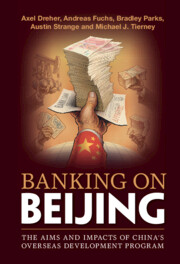Book contents
- Banking on Beijing
- Banking on Beijing
- Copyright page
- Contents
- Figures
- Tables
- Acknowledgments
- Abbreviations
- 1 Why Do We Know So Little about the Aims and Impacts of China’s Overseas Development Program?
- 2 The Journey to Global Creditor
- 3 Counting and Comparing Apples and Dragon Fruits
- 4 Follow the Money
- 5 Apples and Dragon Fruits
- 6 Aid à la Carte
- 7 Paving the Way to Growth and Development?
- 8 Poisonous Dragon Fruits?
- 9 Banking on the Belt and Road
- Postscript: Analysis of China’s Overseas Development Program During the BRI Era With an Updated Dataset
- References
- Index
1 - Why Do We Know So Little about the Aims and Impacts of China’s Overseas Development Program?
Published online by Cambridge University Press: 21 April 2022
- Banking on Beijing
- Banking on Beijing
- Copyright page
- Contents
- Figures
- Tables
- Acknowledgments
- Abbreviations
- 1 Why Do We Know So Little about the Aims and Impacts of China’s Overseas Development Program?
- 2 The Journey to Global Creditor
- 3 Counting and Comparing Apples and Dragon Fruits
- 4 Follow the Money
- 5 Apples and Dragon Fruits
- 6 Aid à la Carte
- 7 Paving the Way to Growth and Development?
- 8 Poisonous Dragon Fruits?
- 9 Banking on the Belt and Road
- Postscript: Analysis of China’s Overseas Development Program During the BRI Era With an Updated Dataset
- References
- Index
Summary
This chapter introduces the central argument of the book: that China’s 21st- century transition from a “benefactor” to a “banker” has had far-reaching im- pacts in low-income and middle-income countries that are not yet widely understood. Beijing’s growing use of debt rather than aid to bankroll big-ticket infrastructure projects has created new opportunities for developing countries to achieve rapid socioeconomic gains, but it has also introduced major risks, including corruption, conflict, and environmental degradation. Some countries are more effective than others at managing these risks and rewards. This chapter “zooms in” on two countries—Sri Lanka and Tanzania—to illustrate the tension between efficacy and safety confronted by developing countries banking on Chinese development finance. It also provides a roadmap for the rest of the book.
- Type
- Chapter
- Information
- Banking on BeijingThe Aims and Impacts of China's Overseas Development Program, pp. 1 - 32Publisher: Cambridge University PressPrint publication year: 2022
- 1
- Cited by

